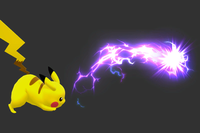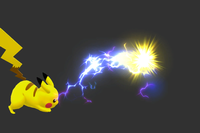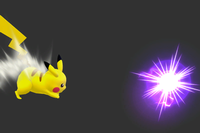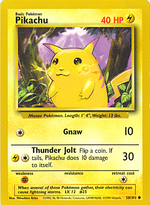Thunder Jolt: Difference between revisions
(→Instructional quotes: See Skull Bash edit) |
m (→Technical details: SmashPedia link) |
||
| Line 122: | Line 122: | ||
[[Category:Pichu (SSBM)]] | [[Category:Pichu (SSBM)]] | ||
[[Category:Pichu (SSBU)]] | [[Category:Pichu (SSBU)]] | ||
[[es:Rayo Eléctrico]] | |||
Revision as of 17:15, March 12, 2023
| Thunder Jolt | |
|---|---|
{{{content1}}}
{{{content2}}} Thunder Jolt in Ultimate. | |
| Users | Pikachu Pichu |
| Universe | Pokémon |
Thunder Jolt (でんげき, Electric Shock) is Pikachu and Pichu's neutral special move.
Overview
The user will shoot a small ball of electricity that will hit its opponent.
Upon use, the user drops a sphere of electricity diagonally downwards, which can deal with medium damage as it falls. If it lands on a surface, it turns into an arcing wave of electricity that hops along the terrain's surface and deals slightly less damage. However, Pichu's version deals consistent damage in Ultimate regardless of the circumstances. The projectile will wrap around corners and snake along walls and even ceilings if the corners are not too sharp and it lives long enough; it cannot wrap around the underside of soft platforms due to there being no ceiling to latch onto. When the move is used on the ground, it essentially turns into the waveform immediately.
Like its other specials and electrically charged attacks, Thunder Jolt damages Pichu upon use, inflicting 1% (0.7% in Ultimate) damage each time. However, it deals considerably more damage than Pikachu's to compensate. Kirby also gets the damage if using the move after having copied Pichu.
Staleness glitch
Thunder Jolt has a glitch relating to stale-move negation that began in Melee and has appeared in every game since. When the move is used in the air and then lands, the arcing wave created points its staleness slot to whatever the user is doing, rather than to match the staleness slot of the object that created it (the aerial ball). This means that if the user is doing another move when the projectile lands, the arcing wave's staleness will act as if it were that move when it connects. For example, if Pikachu is doing an up smash, the wave will use the current staleness of Pikachu's up smash, and if it hits it will stale the up smash. If the user is not doing an attack (e.g. simply standing), the projectile will not have any stale slot, dealing base damage (neither fresh nor stale) and not advancing the queue at all.
Instructional quotes
| Use this ground-hugging projectile attack while standing or jumping. | ||
| Release a jolt of electricity that moves forwards by bouncing along the ground. Also usable in midair. | ||
| Fire bouncing balls of electricity. | ||
| Sends a ball of electricity bouncing along the stage. | ||
| Sends a ball of electricity bouncing across the stage. The ball is faster than Pikachu's! |
Customization
Special Move customization was added in Super Smash Bros. 4. These are the variations:
- Thunder Jolt: Default.
- Thunder Wave: Inflicts roughly half as much damage and travels much less distance, but paralyzes targets.
- Thunder Shock: Is thrown horizontally and disappears upon hitting the ground without bouncing. Initially weaker than the regular variant, but unleashes a powerful blast at the end.
Origin
Unlike most other special moves that Pokémon use in the Super Smash Bros. games, there has never been a move named Thunder Jolt in any of the mainline Pokémon RPGs. Thunder Jolt instead originates from the Pokémon Trading Card Game, first debuting as a move present on the original Pikachu card as well as the original Electrode card - though the move's English name originates from the former. The move's original effect in the TCG, where it damages the Pokémon under certain circumstances, is similar to how Thunder Jolt works when used by Pichu; however, this is not exclusive to Thunder Jolt, as all of Pichu's Electric-type moves damage itself. Thunder Jolt would later become a reoccuring move in the TCG for Lightning-type Pokémon, appearing on cards such as Mareep, Helioptile and Toxtricity, though it has never appeared as a move on a Pichu card.
Its custom versions, however, are actual moves in the Pokémon games and match their effects accurately. Thunder Wave does no damage in the Pokémon RPGs, but it inflicts the Paralysis status. Thunder Shock is a basic low-level Electric-type move. Pikachu learns both Thunder Wave and Thunder Shock by leveling up in all games since the moves were first introduced in Generation I.
Gallery
Pikachu's Thunder Jolt in Melee.
Thunder Jolt performed in midair in Brawl.
Thunder Jolt following the platform it lands on in Brawl.
Pre-release shot of Thunder Jolt in Super Smash Bros. for Wii U.
Pikachu using Thunder Jolt as shown by the Move List in Ultimate.
Names in other languages
Trivia
- The version of the move in Smash 64 has a hitbox that does not match with its appearance - it tightly hugs the ground as the visual effect bounces over it. Melee reworks the attack to have a hitbox in the expected place as well as one under the arch to hit crouchers. Brawl, however, deletes this coverage hitbox.
- In Smash 64, an interesting glitch can occur. When the user sends a grounded Thunder Jolt over a ledge (such as the one left of the Greenhouse on Hyrule Castle) while an opponent Fox's Reflector is active (and very near but not touching the wall), the Thunder Jolt's sprite will continue through the opponent with the animation direction reversed in a sort of electrical moonwalk, making the arc appear to bounce completely vertically rather than parabolically. This is purely visual and does not affect its hitbox, speed or duration.
- The voice clip played when Pikachu uses the move in Smash 64 is taken directly from a scene in episode 24 of the Pokémon anime series.
- In the French, German, Italian and Spanish translations of Melee and Brawl, this move is referred with the respective names used in those languages for Thunderbolt, a move present in every Pokémon game. Since Super Smash Bros. 4, this discrepancy has been corrected in each of these localizations, except the Latin American Spanish one.
Technical details
Pikachu:
- Pikachu (SSB)/Neutral special
- Pikachu (SSBM)/Neutral special
- Pikachu (SSBB)/Neutral special
- Pikachu (SSB4)/Neutral special
- Pikachu (SSBU)/Neutral special
Pichu:
















